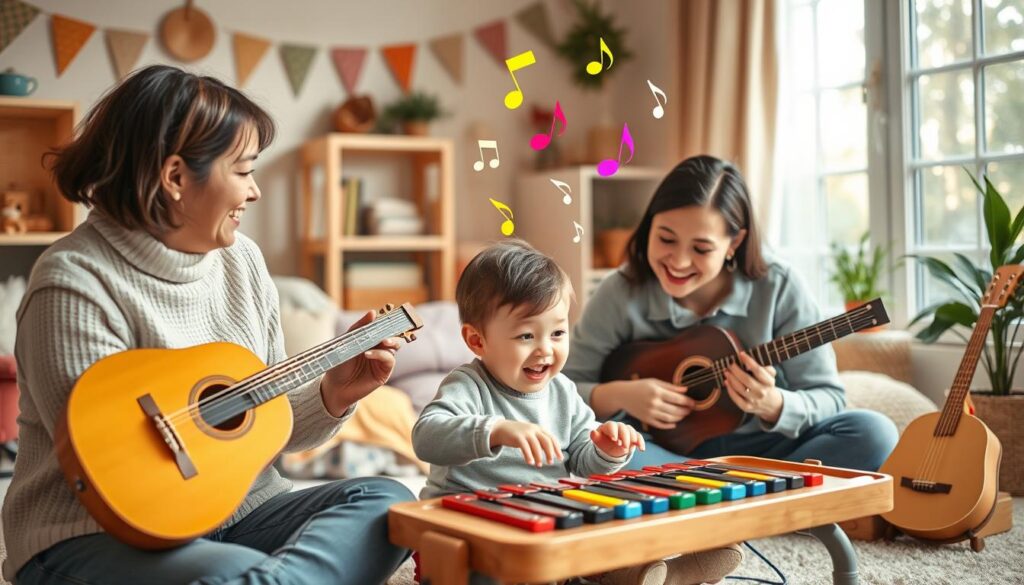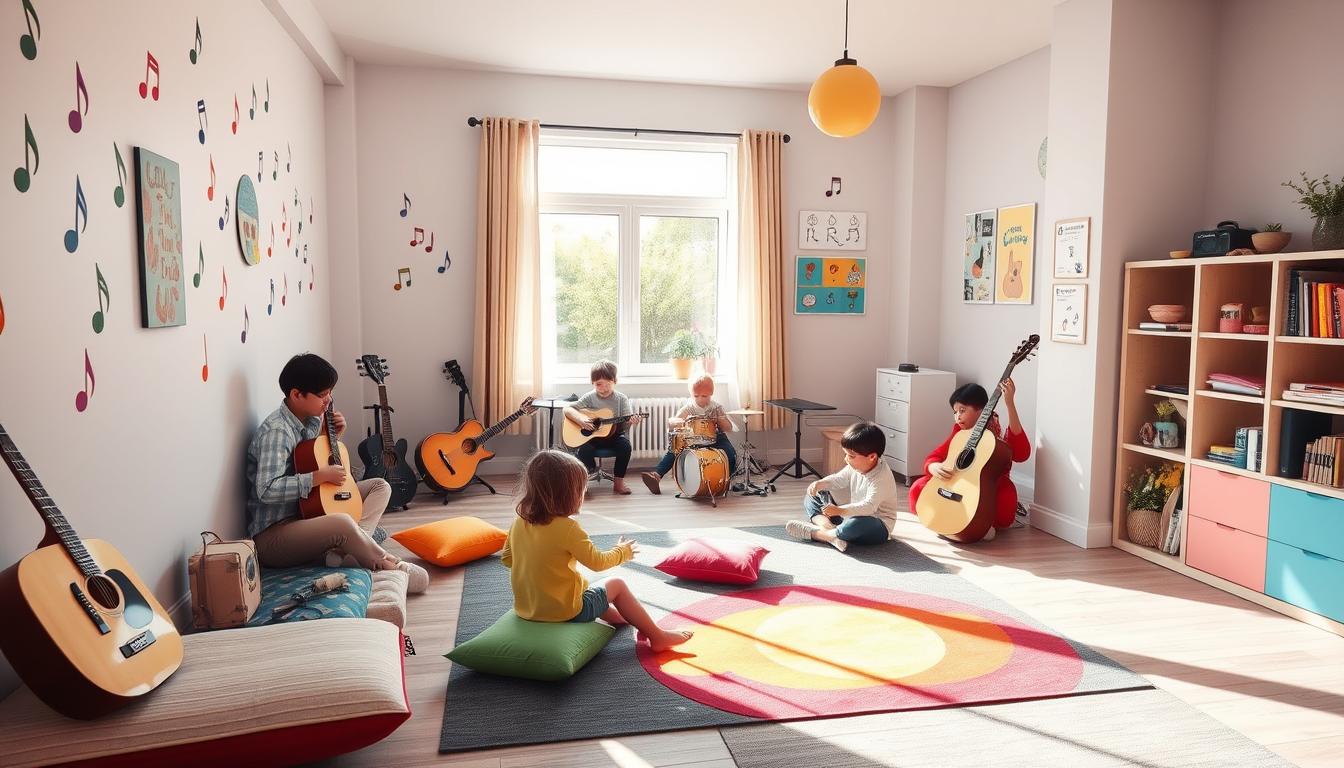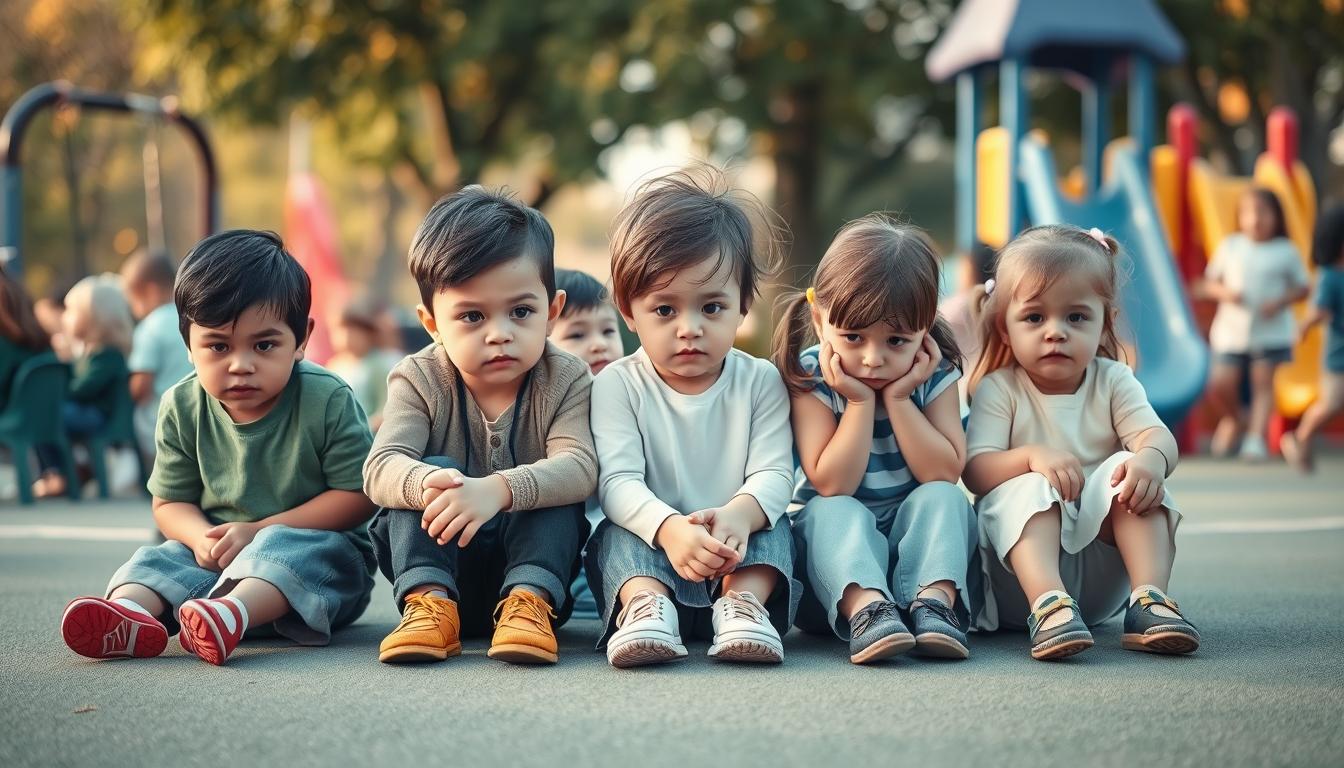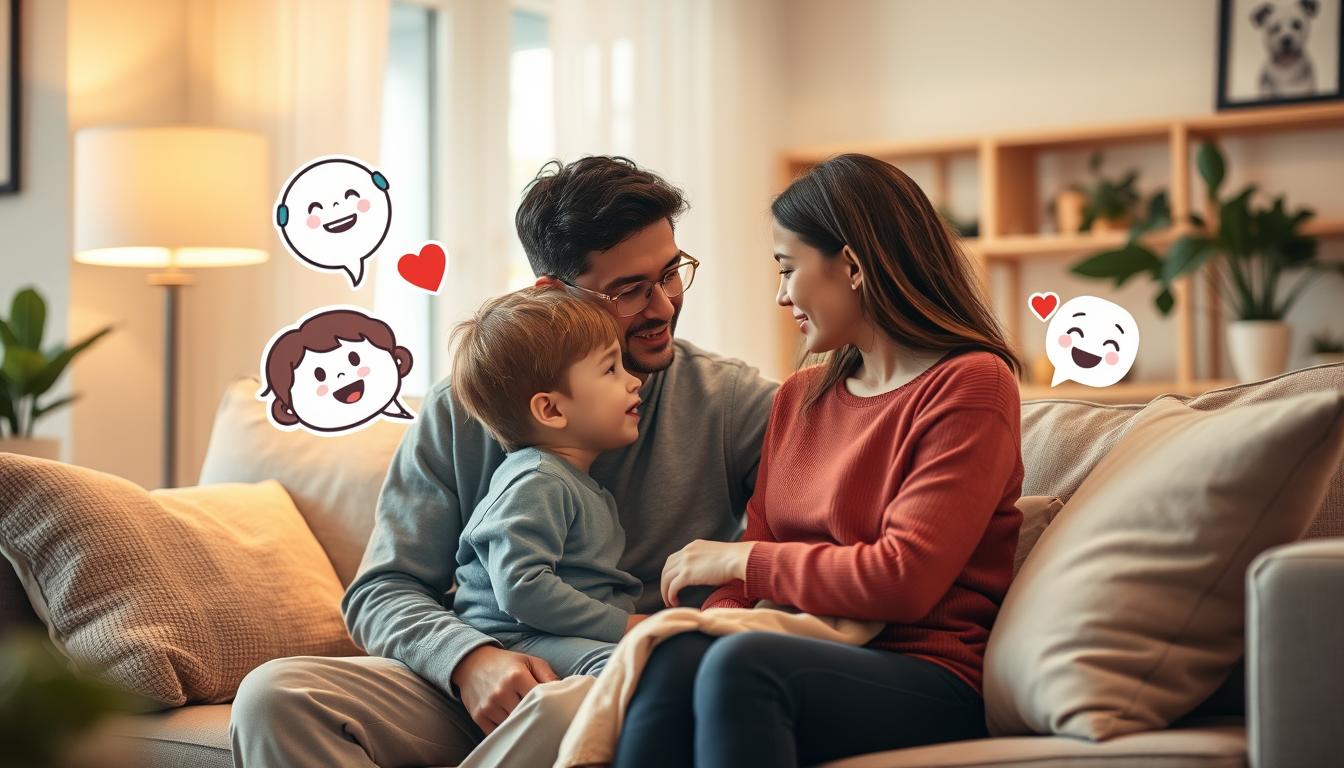Did you know that 1 in 6 children aged 2-8 years experiences a mental health disorder? Music therapy is a powerful tool for kids’ mental health. It offers a unique way to heal emotions and grow cognitively (Music Therapy for Kids: The Benefits of Music for Mental Health).
I’ve seen how music therapy changes lives. It’s more than just fun music. It’s a deep way to help kids deal with tough emotions.
Music therapy is a gentle, fun way to tackle mental health issues in kids. It can lower anxiety and boost communication skills. This approach helps kids grow emotionally and heal in new ways.
Key Takeaways
- Music therapy offers a holistic approach to children’s mental health
- It can help manage stress and emotional challenges
- Supports cognitive development and emotional intelligence
- Provides a safe, creative outlet for self-expression
- Effective for children with various mental health needs
Understanding the Power of Music in Child Development
Music is a powerful tool that changes child development in amazing ways. As I’ve learned about music and brain development, I’ve found interesting facts. Melodies and rhythms shape young minds in incredible ways.
Neuroscientists know that music therapy boosts cognitive function in kids. The brain makes complex connections when it hears music. These connections help with learning and emotional smarts.
How Music Affects Brain Development in Children
Musical experiences work out the brain in a special way. Kids who listen to music do better in:
- Spatial reasoning skills
- Language processing abilities
- Memory retention
- Emotional regulation
The Role of Rhythm and Melody in Learning
Rhythm and melody help kids learn better. Musical patterns make the brain more flexible. This helps kids learn and remember more easily. Music uses different senses to build strong learning networks.
| Musical Activity | Cognitive Benefit | Age Group |
|---|---|---|
| Singing | Language Development | 2-5 years |
| Instrumental Practice | Motor Skills & Concentration | 6-12 years |
| Listening to Complex Music | Abstract Thinking | 10-15 years |
Musical Intelligence and Cognitive Growth
“Music is the landscape of the mind” – Unknown
Musical intelligence is more than just enjoying music. It’s a complex skill that mixes emotions, analysis, and creativity. Kids with strong musical smarts solve problems better and do well in school.
Music Therapy for Kids: The Benefits of Music for Mental Health
Music therapy is a powerful tool for kids’ mental health. It offers a special way to help young minds feel better emotionally and psychologically. Music does more than just entertain.
“Music can heal the wounds which medicine cannot touch” – Debasish Mridha
Therapeutic music gives kids a safe place to show and feel their emotions. It helps them learn important emotional skills through music. This includes:
- Reducing anxiety and stress
- Improving mood regulation
- Enhancing self-expression
- Boosting self-esteem
Studies show music therapy works well for many mental health issues. Kids often find it easier to share their feelings through music than talking.
| Mental Health Benefit | Music Therapy Approach |
|---|---|
| Emotional Regulation | Rhythm and melody techniques |
| Stress Reduction | Guided listening and improvisation |
| Communication Skills | Interactive musical games |
The magic of music therapy lies in its ability to reach children on an emotional level, providing a non-threatening pathway to healing and personal growth. By adding music therapy to treatment plans, mental health experts can help kids better understand and manage their feelings.
How Music Therapy Supports Emotional Regulation in Children
Music therapy is a powerful way to help kids manage their feelings. It uses music to teach them about emotions and how to control them.
Exploring emotions through music is a fun journey for kids. Music therapy gives them a special way to express and understand their feelings.
Managing Stress Through Musical Expression
Stress affects kids in many ways. Music therapy helps them deal with these feelings by:
- Offering a safe way to release emotions
- Creating soothing rhythms
- Lowering anxiety with musical activities
“Music can heal the wounds which medicine cannot touch” – Debasish Mridha
Building Emotional Awareness with Songs
Songs and improvisation are key for kids’ mental health. They help kids:
- Recognize and name their feelings
- Understand what makes them feel certain ways
- Learn to think about their emotions
Creating Healthy Coping Mechanisms
Music therapy teaches kids to use music as a way to cope. This helps them become more emotionally strong and smart.
The power of music changes how kids see their emotions. It gives them confidence and understanding.
Music as a Tool for Managing Childhood Anxiety and Depression

Music therapy is a powerful tool for helping kids with mental health issues. It’s a gentle way to manage anxiety and depression in young people. Studies show that music can greatly improve how kids feel emotionally and mentally.
Children with anxiety and depression can find relief through music. The rhythms and melodies in music offer a safe space for them to express their feelings. This is helpful because they might not know how to talk about their emotions.
“Music speaks what cannot be expressed, soothes the mind and gives it rest.” – Therapist Wellness Center
- Reduces stress hormones in the body
- Provides emotional expression channels
- Improves mood through neurochemical changes
- Creates positive coping mechanisms
There are special music techniques for anxiety and depression:
| Technique | Impact on Children’s Mental Health |
|---|---|
| Rhythmic Drumming | Releases emotional tension |
| Guided Musical Visualization | Reduces anxiety symptoms |
| Songwriting Therapy | Enhances emotional processing |
Therapeutic music is a caring way to help children’s emotional health. It offers hope and healing through music, a universal language.
Supporting Children with Autism Through Musical Interventions
Music therapy is a powerful tool for kids with autism spectrum disorder (ASD). It helps with communication, social skills, and sensory integration. This can greatly improve their mental health and growth.
Children with autism find it hard to communicate in usual ways. Music therapy offers new ways to express and understand. It helps break down communication barriers.
Communication Skills Development
Music is a universal language for kids with ASD. Through music therapy, they can:
- Express emotions better
- Improve talking and listening skills
- Practice sharing and listening
- Grow their vocabulary and understanding
Social Interaction Through Group Music Activities
Group music sessions are safe spaces for kids with autism to connect socially. These activities help them:
- Work together better
- Get social cues
- Feel more confident in groups
- Make friends
Sensory Integration Benefits
Music therapy is great for kids with ASD’s sensory needs. Rhythmic patterns and musical instruments help regulate their senses. This makes it easier for them to handle sensory challenges.
“Music speaks what cannot be expressed, soothes the mind and gives it rest.” – Unknown
Using music for autism spectrum disorder, therapists can change lives. They help kids with their mental health and growth.
Music Therapy Techniques for ADHD Management
Managing ADHD can be tough for kids and parents. Music therapy is a powerful tool to help. It uses music to improve focus, reduce hyperactivity, and boost brain function.
Music therapy has special methods to help kids with ADHD. It helps them control their feelings and focus better. It uses the brain’s natural love for rhythm and sound.
- Rhythmic entrainment exercises to improve attention span
- Instrument playing for motor skill development
- Structured musical activities targeting executive function
- Guided relaxation through calming musical sequences
Studies show music therapy helps with ADHD symptoms in kids. It makes learning fun and helps with emotional growth.
| Music Therapy Technique | Primary ADHD Benefit | Recommended Age Group |
|---|---|---|
| Drumming Exercises | Impulse Control | 6-12 years |
| Melodic Breathing | Emotional Regulation | 8-14 years |
| Rhythmic Movement | Motor Skill Coordination | 5-10 years |
“Music can be a transformative tool in helping children with ADHD develop essential cognitive and emotional skills.” – Dr. Emily Roberts, Child Psychologist
Adding music therapy to a child’s life can open up new ways to learn and grow.
Incorporating Music into Daily Routines for Better Mental Health
Music therapy techniques are great for kids’ mental health. They make daily routines special. This helps kids manage their feelings better.
Adding music to daily life is good for mental health. Kids become more emotionally strong. They also learn positive habits through music.
Morning Music Rituals
Music in the morning helps kids feel good. Here are some ideas:
- Create a cheerful playlist to wake up children
- Use upbeat songs during morning preparations
- Sing motivational songs while getting dressed
Bedtime Musical Practices
Music at bedtime helps kids relax and sleep better:
- Play soft, soothing instrumental music
- Use gentle lullabies to reduce nighttime anxiety
- Create a consistent bedtime musical routine
Transition Time Songs
Musical cues ease tough transitions for kids:
| Transition Scenario | Musical Strategy |
|---|---|
| Moving from playtime to study time | Short, rhythmic transition song |
| Preparing for bedtime | Calming melody sequence |
| Getting ready for school | Energetic morning motivation song |
“Music can heal the wounds which medicine cannot touch.” – Debasish Mridha
Parents can improve kids’ emotional growth and mental health with music. It’s a powerful tool for daily routines.
The Role of Parents in Music Therapy Success
Parental involvement is key in music therapy for kids’ mental health. When parents get involved, the chances of success go up a lot.

Music therapy needs teamwork from therapists, kids, and families. I’ve seen how parents who get it and join in make a big difference. They help create a better place for healing.
- Attend therapy sessions to learn intervention strategies
- Practice musical activities at home
- Communicate regularly with music therapists
- Create consistent musical routines
Parents can turn music therapy into a special bonding time. By learning certain techniques, families can use music therapy at home too.
“Music is the language of emotional connection between parents and children” – Dr. Emily Rodriguez, Child Psychology Specialist
| Parental Action | Potential Benefit |
|---|---|
| Active Music Participation | Enhanced emotional communication |
| Home Music Activities | Continued therapeutic progress |
| Consistent Musical Routine | Improved emotional regulation |
By using music therapy, parents become vital in helping their kids. They help their kids grow emotionally and become stronger.
Measuring Progress: Signs That Music Therapy Is Working
Seeing the benefits of music therapy can be tricky. Parents and therapists look for clear signs of improvement in children. These signs help show if the therapy is working and guide future steps.
Checking if music therapy is effective means watching how a child grows. This growth is in many areas, all connected. It shows how well a child’s mind and feelings are improving.
Behavioral Improvements
Music and thinking skills are closely tied. Look for these signs of positive change:
- Reduced impulsivity
- Enhanced self-regulation
- Improved attention span
- More consistent emotional responses
Emotional Growth Indicators
Music therapy greatly helps children’s mental health. Watch for these signs of emotional growth:
- Increased ability to express feelings
- Better stress management skills
- Enhanced empathy towards others
- Improved self-confidence
Academic Performance Changes
Music therapy can also help with learning. Look for these signs of better school performance:
| Area of Improvement | Potential Indicators |
|---|---|
| Concentration | Longer study sessions, fewer distractions |
| Memory | Faster recall, improved retention |
| Problem-solving | More creative approaches, quicker solutions |
“Music therapy is not just about creating melodies, but about transforming lives one note at a time.” – Dr. Emily Richardson, Child Psychologist
Remember, every child’s journey with music therapy is different. It takes patience and careful watching to see the progress.
Conclusion
Music therapy is a powerful way to help children’s mental health. It can unlock amazing growth in emotions and thinking. Music is more than just fun; it’s a tool for self-expression and healing.
Music helps kids understand and manage their feelings. It’s great for kids with autism to learn to communicate. It also helps those with anxiety feel better. Parents and caregivers can help by making music a part of their child’s life.
Studies show music’s big impact on kids’ mental health. As we learn more about music and the brain, we find new ways to help kids grow. I suggest families try music therapy alongside other mental health methods.
Music is a special language that touches a child’s heart and mind. It’s a safe way for kids to deal with their feelings. It helps them become stronger and learn important skills. By using music, we can help kids face mental health challenges with more confidence and understanding.



